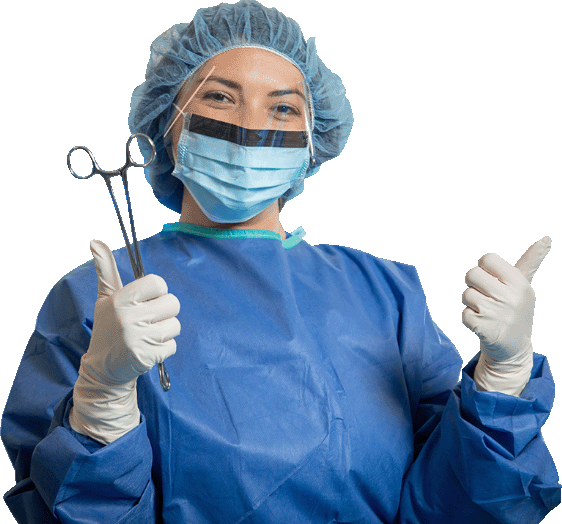Surgical Technology
The Surgical Technologist program at Glendale Career College trains students with the skills to begin working alongside surgeons, registered nurses and other medical professionals as part of the medical team, providing care to patients during the crucial periods of surgery.
Surgical Technologists (also known as surgical techs, operating room technicians, and OR techs) assist in surgical operations, preparing operating rooms and helping surgeons, nurses, and doctors before and during surgical procedures.
Graduates of this program earn their Associate of Occupational Science (AOS) degree and are qualified to work in surgical centers, delivery rooms, and medical clinics and may be employed as a member of an operating room team.
Thanks to advances in medical technology, surgery is safer, and more people are having operations to treat a number of illnesses and injuries. Also, the number of people with access to health insurance is projected to increase because of federal health insurance reform, which should lead to a greater need for surgical services, too. As a result, there is a growing demand for trained Surgical Technologists.
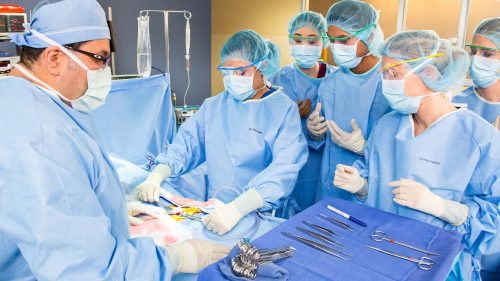
Surgical Technology
Surgical Technology Overview
Surgical Technologists, often known as operating room technicians, get operating rooms ready, prepare equipment, and help doctors during surgeries. Surgical Technologists are tasked with readying the operating room by being sure the surgical instruments and equipment are set out, preparing patients for surgery, assisting the surgical team with donning sterile gowns and gloves, along with preparing sterile solutions and medications used in surgery.
After the operation, Surgical Technologists may apply bandages and other dressings to the incision site. They may also assist with moving patients to recovery areas and restocking operating rooms after surgeries.
Surgical Technologists often take on a number of crucial tasks, including:
The Surgical Technology Associate of Occupational Science (AOS) degree program at Glendale Career College is a career-focused hands-on training program that provides students with the knowledge and technical skills needed to begin working with surgeons, anesthesiologists, certified registered nurse anesthetists, registered nurses, and other surgical personnel as a vital member of a surgical team.
*Glendale Career College is not able to guarantee employment.
View CST Exam Passage Rates
Proudly accredited, licensed to operate and/or recognized by the following institutions:

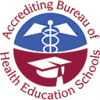





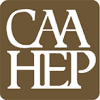


The Surgical Technology Associate of Occupational Science (AOS) degree program can be taken at the following campuses:
Meet a Graduate
Questions?
Let us help you launch your career by contacting us today. Simply fill out our contact form or call us at 800-639-3384.
Classes are starting soon!
Surgical Technology Careers & Work Environment
The Surgical Technologist program at Glendale Career College offers the skills and training required to start a career working in a number of different medical and health care facilities.
Graduates of the program often find work at:
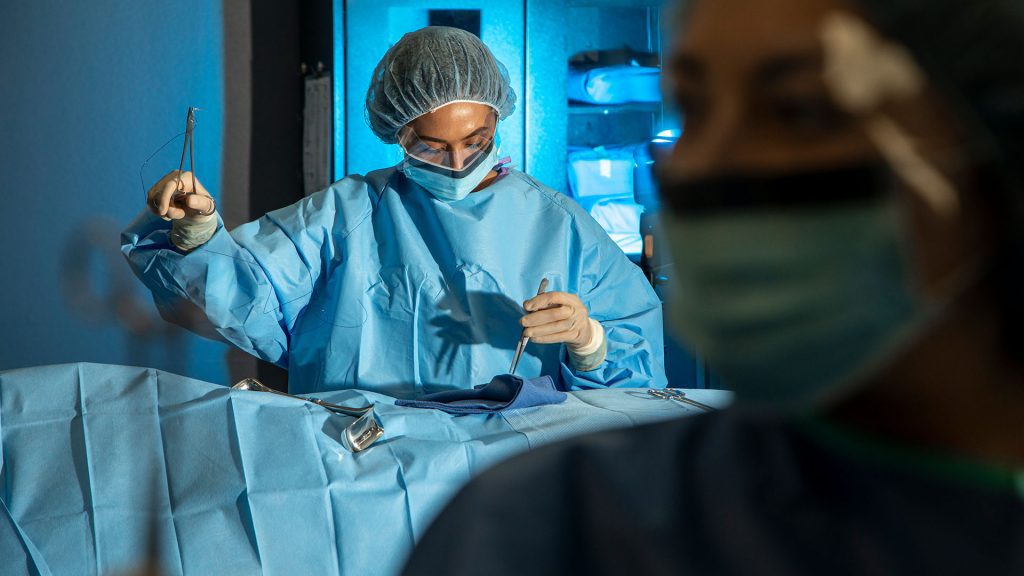


Quick Facts about Surgical Technologists*
Surgical Technology Course Material
The Surgical Technologist program at Glendale Career College is a career-based program that offers the technical skills and hands-on training needed to start working with surgeons, anesthesiologists, certified registered nurse anesthetists, registered nurses, and other surgical personnel as a vital member of a surgical team. The Surgical Technologist program is designed to teach in all phases of Surgical Technology, and to prepare competent, entry-level Surgical Technologists in the cognitive (knowledge), psychomotor (skills), and affective (behavior) learning domains.
Upon completion, graduates will be able to work effectively with and under the supervision of surgeons or registered nurses and become a crucial part of the team providing care to patients during surgery. Much of the training is focused on the clinical aspect of the program where the students learn firsthand how to help set up the operating room; prepare patients for surgery; scrub, gown, and glove themselves and other team members; hand instruments and other sterile supplies to surgeons; assist with caring for and disposing of specimens; and help nurses in sterilizing and restocking the operating room for the next surgery. The curriculum reflects the latest advances in biomedical science and is divided into class course modules, including three clinical externships where students will have the chance to apply the skills they learn in the classroom in real health care settings.
Seminar for Success
This provides an introduction of learning readiness skills, including how to study, different learning styles, reading skills to increase comprehension, time and stress management, communication, teamwork, and leadership. It also offers an overview of basic math skills related to health care, and an introduction to medical terminology, including word parts and basic medical terms related to body systems. This course also provides an overview of the surgical technology field, along with the requirements of the surgical technology program. Outside preparation and study time, in addition to regular classroom activities, will be necessary to finish the class assignments. This outside preparation may include homework assignments, projects, reading, and required studying.
The Human Body I
This course zeroes in on the structure, function, and disease processes of the human body, including the organizational structure of the human body, the Integumentary, Musculoskeletal, Neuro-Sensory, and Endocrine Systems, along with the medical terminology related to these systems. Students will also gain an overview of the concepts and principles of microbiology as related to surgical practice, including microbe-based diseases and immunology. Outside preparation and study time, in addition to regular classroom activities, will be necessary to finish class assignments. This outside preparation may include homework assignments, projects, reading, and required studying.
Fundamentals
This course provides students with an introduction to the field of Surgical Technology by covering topics and concepts related to the health care setting. It covers the job description of the Surgical Technologist and descriptions of the roles of care providers in the OR, including the role of the Surgical Technologist-Scrub Role (STSR). The curriculum also includes ethical, moral, and medico- legal practice, professional communication, teamwork, and employment skills. Students will review operating room practice and discuss the biopsychosocial needs of the surgical patient. In addition, the course covers the principles and techniques of disinfection, sterilization, and antisepsis in the Operating Room. The laboratory component of the course emphasizes the skills needed to process surgical instruments and supplies in a non-patient setting. Outside preparation and study time, in addition to regular classroom activities, will be necessary to finish the class assignments. This outside preparation may include homework assignments, projects, reading, and required studying.
The Human Body II
This course covers the structure, function, and disease processes of the human body, including the Circulatory, Cardiovascular, Lymphatic, Respiratory, Gastrointestinal, Genitourinary, and Male and Female Reproductive Systems, along with the medical terminology related to these systems. In addition, it offers an introduction to pharmacology, including medication types, sources, classifications, dosages, uses, and medications often utilized in surgery. Students will also discuss anesthesia, including methods, types, administration, and potential complications. Outside preparation and study time, in addition to regular classroom activities, will be necessary to finish the class assignments. This outside preparation may include homework assignments, projects, reading, and required studying.
Asepsis
Students gain an introduction to the knowledge, skills, and techniques used to ready the patient for the surgical experience and to create and preserve the sterile field during surgery. Topics covered include pre-operative patient preparation; gowning and gloving; creating the sterile field with equipment, instruments, and supplies; patient positioning; and skin preparation. The curriculum also includes pre-, intra-, and postoperative case management techniques. Outside preparation and study time, in addition to regular classroom activities, will be necessary to finish the class assignments. This outside preparation may include homework assignments, projects, reading, and required studying.
Mock Lab
This course offers a mock laboratory where students can develop skills and practical performances by getting ready for a surgical procedures in a non-patient contact environment. The focus will be on learning and understanding the different responsibilities of the scrub and assistant circulator roles in the operating room and how to build teamwork by providing the student with the chance to take on sterile and non-sterile member roles. Students also gain an understanding of safety concepts, including instrument, sponge, and needle counts, along with patient identification. During this course, students have the opportunity to discuss, understand, and demonstrate group dynamics, cultural diversity, leadership, and teamwork.
Surgical Procedures I
This course offers a mock laboratory where students can develop skills and practical performances by getting ready for surgical procedures in a non-patient contact environment. The focus will be on learning and understanding the different responsibilities of the scrub and assistant circulator roles in the operating room and how to build teamwork by providing the student with the chance to take on sterile and non-sterile member roles. Students also gain an understanding of safety concepts, including instrument, sponge, and needle counts, along with patient identification. During this course, students have the opportunity to discuss, understand, and demonstrate group dynamics, cultural diversity, leadership, and teamwork.
Surgical Procedures Lab I
This course provides another laboratory environment, allowing students to further develop skills and practical performances by preparing for a number of basic surgical procedures in a non-patient contact environment. The curriculum focuses on learning and understanding the different roles in the operating room and how to build teamwork by providing mock situations where students have the chance to take on and non-sterile member roles. The curriculum also provides an understanding of safety concepts, including instrument, sponge, and needle counts, along with patient identification. Students will have the opportunity to discuss, understand and demonstrate group dynamics, cultural diversity, leadership, and teamwork.
Surgical Procedures II
Students will focus on integration of the professional knowledge of the Surgical Technologist using the procedural format in this course. Topics such as the anatomy, physiology, pathophysiology, case management, and patient considerations of Orthopedic Surgery, Ophthalmic Surgery, Plastic/Reconstructive Surgery, Cardiothoracic and Peripheral Vascular Surgery, and Neurosurgical Surgery will also be covered. Outside preparation and study time, in addition to regular classroom activities, will be necessary to finish the class assignments. This outside preparation may include homework assignments, projects, reading, and required studying.
Surgical Procedures Lab II
This course offers a laboratory environment where students can further develop skills and practical performances by getting ready for a number of more complex surgical procedures in a non-patient contact environment. The curriculum focuses on learning and understanding the different roles in the operating room and how to build teamwork by providing mock situations where students have the chance to take on sterile and non- sterile member roles. It also offers an understanding of safety concepts, including instrument, sponge, and needle counts, along with patient identification. During this course, students have the chance to discuss, understand and demonstrate group dynamics, cultural diversity, leadership, and teamwork.
Sterile Processing
This course gives students the chance to complete a rotation in the Sterile Processing Department of a health care facility where they will participate in the instrument reprocessing experience, including sterilization, disinfection, tray assembly, sterile storage, and distribution.
Clinical Externship I
This course gives students the opportunity to apply their professional knowledge, skills, and behaviors in a patient care setting at a local health care facility. The student will actively participate in basic to moderately complex surgical procedures in the assistant circulator, observation, second scrub, and first scrub roles. Outside preparation and study time, in addition to regular classroom activities, will be necessary to finish the class assignments. This outside preparation may include homework assignments, projects, reading, and required studying.
Clinical Externship II
This course gives students the chance to apply their professional knowledge, skills, and behaviors in a patient care setting at a local health care facility. The student will actively participate in moderately complex to complex surgical procedures in the assistant circulator, observation, second scrub, and first scrub roles. Outside preparation and study time, in addition to regular classroom activities, will be necessary to finish the class assignments. This outside preparation may include homework assignments, projects, reading, and required studying.
CST Exam Review
This course offers students a comprehensive review of the surgical technology curriculum as they prepare to take the National Board for Surgical Technology and Surgical Assisting (NBSTSA) CST® Certification exam and the Program Final Exam (PFE). Outside preparation and study time, in addition to regular classroom activities, will be necessary to finish class assignments. This outside preparation may include homework assignments, projects, reading, and required studying.
Surgical Technology Course Activities
Surgical Technologists, often known as operating room technicians, are a vital part of the surgery team. Before an operation, Surgical Technologists ready the operating room by arranging surgical instruments and equipment. They also get patients ready for surgery by washing and disinfecting incision sites, positioning patients on the operating table, placing sterile drapes over them, and moving them to and from the operating room. Surgical Technologists prepare solutions and medications used in surgery and ensure all surgical equipment is working correctly. They also assist the surgical team with donning sterile gowns and gloves.
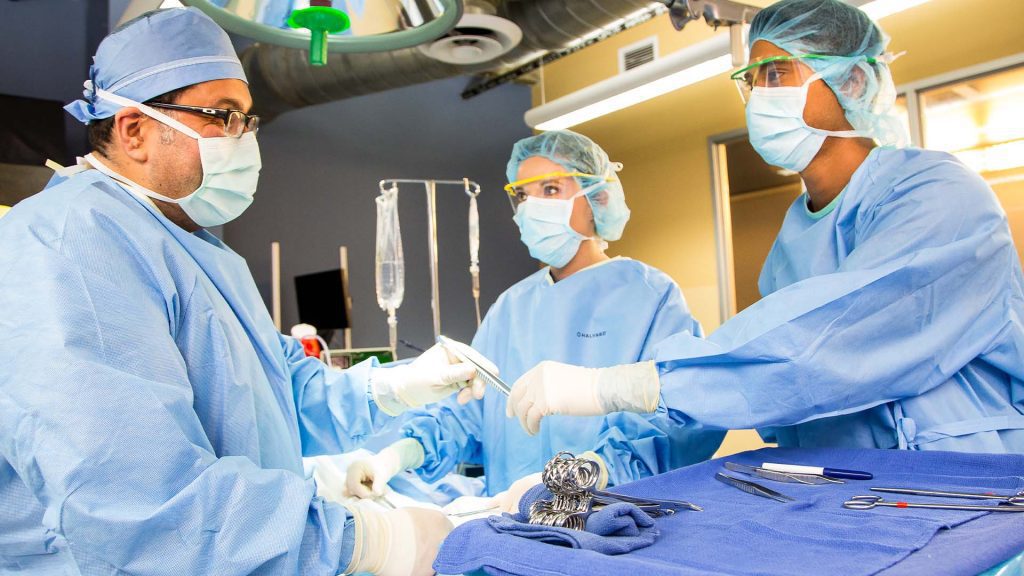


Surgical Technologists typically perform the following tasks:
Request Information
Fill out a short form online and one of our admissions representatives will contact you to answer any questions you have.
Apply Online Now!
Ready to make your decision now? You can apply now online in under a few minutes.
Schedule a Tour
Come and see us in person! Talk to your future instructors, meet your future classmates and get familiar with your new home.
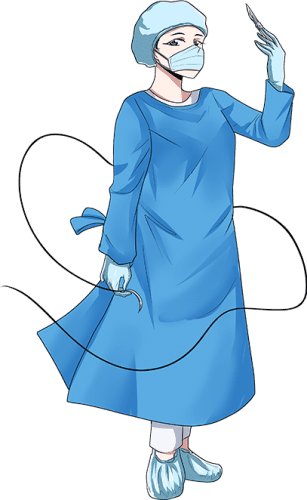

Surgical Technology Overview
Surgical Technologists, often known as operating room technicians, get operating rooms ready, prepare equipment, and help doctors during surgeries. Surgical Technologists are tasked with readying the operating room by being sure the surgical instruments and equipment are set out, preparing patients for surgery, assisting the surgical team with donning sterile gowns and gloves, along with preparing sterile solutions and medications used in surgery.
After the operation, Surgical Technologists may apply bandages and other dressings to the incision site. They may also assist with moving patients to recovery areas and restocking operating rooms after surgeries.
Surgical Technologists often take on a number of crucial tasks, including:
The Surgical Technology Associate of Occupational Science (AOS) degree program at Glendale Career College is a career-focused hands-on training program that provides students with the knowledge and technical skills needed to begin working with surgeons, anesthesiologists, certified registered nurse anesthetists, registered nurses, and other surgical personnel as a vital member of a surgical team.
*Glendale Career College is not able to guarantee employment.
View CST Exam Passage Rates
Proudly accredited, licensed to operate and/or recognized by the following institutions:












The Surgical Technology Associate of Occupational Science (AOS) degree program can be taken at the following campuses:
Meet a Graduate
Questions?
Let us help you launch your career by contacting us today. Simply fill out our contact form or call us at 800-639-3384.
Classes are starting soon!
Surgical Technology Careers & Work Environment
The Surgical Technologist program at Glendale Career College offers the skills and training required to start a career working in a number of different medical and health care facilities.
Graduates of the program often find work at:



Quick Facts about Surgical Technologists*
Surgical Technology Course Material
The Surgical Technologist program at Glendale Career College is a career-based program that offers the technical skills and hands-on training needed to start working with surgeons, anesthesiologists, certified registered nurse anesthetists, registered nurses, and other surgical personnel as a vital member of a surgical team. The Surgical Technologist program is designed to teach in all phases of Surgical Technology, and to prepare competent, entry-level Surgical Technologists in the cognitive (knowledge), psychomotor (skills), and affective (behavior) learning domains.
Upon completion, graduates will be able to work effectively with and under the supervision of surgeons or registered nurses and become a crucial part of the team providing care to patients during surgery. Much of the training is focused on the clinical aspect of the program where the students learn firsthand how to help set up the operating room; prepare patients for surgery; scrub, gown, and glove themselves and other team members; hand instruments and other sterile supplies to surgeons; assist with caring for and disposing of specimens; and help nurses in sterilizing and restocking the operating room for the next surgery. The curriculum reflects the latest advances in biomedical science and is divided into class course modules, including three clinical externships where students will have the chance to apply the skills they learn in the classroom in real health care settings.
Seminar for Success
This provides an introduction of learning readiness skills, including how to study, different learning styles, reading skills to increase comprehension, time and stress management, communication, teamwork, and leadership. It also offers an overview of basic math skills related to health care, and an introduction to medical terminology, including word parts and basic medical terms related to body systems. This course also provides an overview of the surgical technology field, along with the requirements of the surgical technology program. Outside preparation and study time, in addition to regular classroom activities, will be necessary to finish the class assignments. This outside preparation may include homework assignments, projects, reading, and required studying.
The Human Body I
This course zeroes in on the structure, function, and disease processes of the human body, including the organizational structure of the human body, the Integumentary, Musculoskeletal, Neuro-Sensory, and Endocrine Systems, along with the medical terminology related to these systems. Students will also gain an overview of the concepts and principles of microbiology as related to surgical practice, including microbe-based diseases and immunology. Outside preparation and study time, in addition to regular classroom activities, will be necessary to finish class assignments. This outside preparation may include homework assignments, projects, reading, and required studying.
Fundamentals
This course provides students with an introduction to the field of Surgical Technology by covering topics and concepts related to the health care setting. It covers the job description of the Surgical Technologist and descriptions of the roles of care providers in the OR, including the role of the Surgical Technologist-Scrub Role (STSR). The curriculum also includes ethical, moral, and medico- legal practice, professional communication, teamwork, and employment skills. Students will review operating room practice and discuss the biopsychosocial needs of the surgical patient. In addition, the course covers the principles and techniques of disinfection, sterilization, and antisepsis in the Operating Room. The laboratory component of the course emphasizes the skills needed to process surgical instruments and supplies in a non-patient setting. Outside preparation and study time, in addition to regular classroom activities, will be necessary to finish the class assignments. This outside preparation may include homework assignments, projects, reading, and required studying.
The Human Body II
This course covers the structure, function, and disease processes of the human body, including the Circulatory, Cardiovascular, Lymphatic, Respiratory, Gastrointestinal, Genitourinary, and Male and Female Reproductive Systems, along with the medical terminology related to these systems. In addition, it offers an introduction to pharmacology, including medication types, sources, classifications, dosages, uses, and medications often utilized in surgery. Students will also discuss anesthesia, including methods, types, administration, and potential complications. Outside preparation and study time, in addition to regular classroom activities, will be necessary to finish the class assignments. This outside preparation may include homework assignments, projects, reading, and required studying.
Asepsis
Students gain an introduction to the knowledge, skills, and techniques used to ready the patient for the surgical experience and to create and preserve the sterile field during surgery. Topics covered include pre-operative patient preparation; gowning and gloving; creating the sterile field with equipment, instruments, and supplies; patient positioning; and skin preparation. The curriculum also includes pre-, intra-, and postoperative case management techniques. Outside preparation and study time, in addition to regular classroom activities, will be necessary to finish the class assignments. This outside preparation may include homework assignments, projects, reading, and required studying.
Mock Lab
This course offers a mock laboratory where students can develop skills and practical performances by getting ready for a surgical procedures in a non-patient contact environment. The focus will be on learning and understanding the different responsibilities of the scrub and assistant circulator roles in the operating room and how to build teamwork by providing the student with the chance to take on sterile and non-sterile member roles. Students also gain an understanding of safety concepts, including instrument, sponge, and needle counts, along with patient identification. During this course, students have the opportunity to discuss, understand, and demonstrate group dynamics, cultural diversity, leadership, and teamwork.
Surgical Procedures I
This course offers a mock laboratory where students can develop skills and practical performances by getting ready for surgical procedures in a non-patient contact environment. The focus will be on learning and understanding the different responsibilities of the scrub and assistant circulator roles in the operating room and how to build teamwork by providing the student with the chance to take on sterile and non-sterile member roles. Students also gain an understanding of safety concepts, including instrument, sponge, and needle counts, along with patient identification. During this course, students have the opportunity to discuss, understand, and demonstrate group dynamics, cultural diversity, leadership, and teamwork.
Surgical Procedures Lab I
This course provides another laboratory environment, allowing students to further develop skills and practical performances by preparing for a number of basic surgical procedures in a non-patient contact environment. The curriculum focuses on learning and understanding the different roles in the operating room and how to build teamwork by providing mock situations where students have the chance to take on and non-sterile member roles. The curriculum also provides an understanding of safety concepts, including instrument, sponge, and needle counts, along with patient identification. Students will have the opportunity to discuss, understand and demonstrate group dynamics, cultural diversity, leadership, and teamwork.
Surgical Procedures II
Students will focus on integration of the professional knowledge of the Surgical Technologist using the procedural format in this course. Topics such as the anatomy, physiology, pathophysiology, case management, and patient considerations of Orthopedic Surgery, Ophthalmic Surgery, Plastic/Reconstructive Surgery, Cardiothoracic and Peripheral Vascular Surgery, and Neurosurgical Surgery will also be covered. Outside preparation and study time, in addition to regular classroom activities, will be necessary to finish the class assignments. This outside preparation may include homework assignments, projects, reading, and required studying.
Surgical Procedures Lab II
This course offers a laboratory environment where students can further develop skills and practical performances by getting ready for a number of more complex surgical procedures in a non-patient contact environment. The curriculum focuses on learning and understanding the different roles in the operating room and how to build teamwork by providing mock situations where students have the chance to take on sterile and non- sterile member roles. It also offers an understanding of safety concepts, including instrument, sponge, and needle counts, along with patient identification. During this course, students have the chance to discuss, understand and demonstrate group dynamics, cultural diversity, leadership, and teamwork.
Sterile Processing
This course gives students the chance to complete a rotation in the Sterile Processing Department of a health care facility where they will participate in the instrument reprocessing experience, including sterilization, disinfection, tray assembly, sterile storage, and distribution.
Clinical Externship I
This course gives students the opportunity to apply their professional knowledge, skills, and behaviors in a patient care setting at a local health care facility. The student will actively participate in basic to moderately complex surgical procedures in the assistant circulator, observation, second scrub, and first scrub roles. Outside preparation and study time, in addition to regular classroom activities, will be necessary to finish the class assignments. This outside preparation may include homework assignments, projects, reading, and required studying.
Clinical Externship II
This course gives students the chance to apply their professional knowledge, skills, and behaviors in a patient care setting at a local health care facility. The student will actively participate in moderately complex to complex surgical procedures in the assistant circulator, observation, second scrub, and first scrub roles. Outside preparation and study time, in addition to regular classroom activities, will be necessary to finish the class assignments. This outside preparation may include homework assignments, projects, reading, and required studying.
CST Exam Review
This course offers students a comprehensive review of the surgical technology curriculum as they prepare to take the National Board for Surgical Technology and Surgical Assisting (NBSTSA) CST® Certification exam and the Program Final Exam (PFE). Outside preparation and study time, in addition to regular classroom activities, will be necessary to finish class assignments. This outside preparation may include homework assignments, projects, reading, and required studying.
Surgical Technology Course Activities
Surgical Technologists, often known as operating room technicians, are a vital part of the surgery team. Before an operation, Surgical Technologists ready the operating room by arranging surgical instruments and equipment. They also get patients ready for surgery by washing and disinfecting incision sites, positioning patients on the operating table, placing sterile drapes over them, and moving them to and from the operating room. Surgical Technologists prepare solutions and medications used in surgery and ensure all surgical equipment is working correctly. They also assist the surgical team with donning sterile gowns and gloves.



